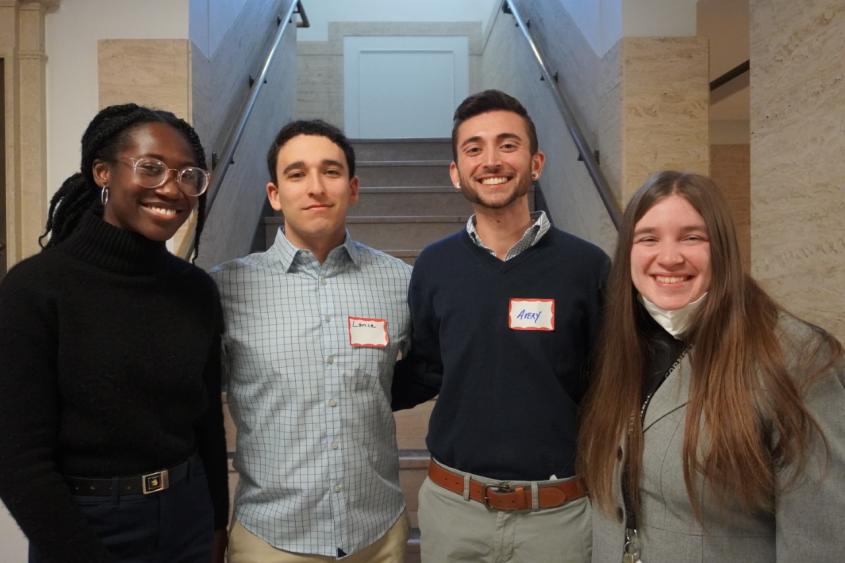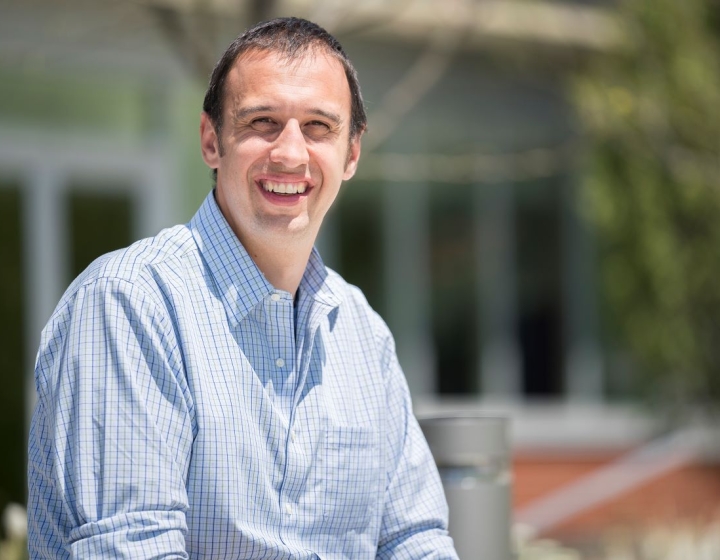M.P.H. students win Cornell Global Health Case Competition
Two students in Cornell’s Master of Public Health program were part of the winning team in this year’s 2023 Global Health Case Competition, a campus-wide contest that asks students to develop solutions for a real-world public health problem.
In February, nineteen teams of Cornell undergraduate and graduate students, including 50 public health graduate students, had one week to research and propose innovative public health interventions for a fictitious case: how to enhance India’s bid for the 2036 Summer Olympics by incorporating the One Health paradigm, which recognizes the inextricable link between human, animal, and ecosystem health.
Avery Sirwatka, M.P.H.’24, and Milcah Abena Andoh, M.P.H.’24, along with teammates Lance Rombro, a senior in Biology & Society, and Sarah McIlroy, a junior in the School of Industrial and Labor Relations, won the Cornell competition.
A skill-building competition
Audrey Baker, manager of applied practice with the MPH Program, helped coordinate MPH students’ involvement and reflections on skill development. “This competition helps our students gain experience communicating across differences with collaborators of diverse backgrounds,” Baker said. “They also have the chance to understand and experience the value and challenges of having different personality types and expertise on a team.”
Using the budget parameters available, their team proposed three interventions to help address population health and preparedness in India via investments for the Olympics: Creating urban greenspace in linear parkways to boost biodiversity, improve air quality, and provide lasting improvements for local residents; installing floating, solar-powered water filtration systems to provide clean drinking water with minimal environmental impacts; and launching a tobacco cessation campaign to promote reduce disease rates, air pollution, and litter.
“Given the timeline of the 2036 Olympic games and our sizeable budget, we felt we could offer multi-pronged approach,” Andoh said. “The idea of equity for all people was at the center of our interventions, and we focused on how local stakeholders could be involved.”
Tackling persistent problems
As part of the winning team, Sirwatka, Abena Andoh, Rombro, and McIlroy traveled to Emory University in March to compete in the international Global Health Case Competition, which included teams from 29 schools in six countries. At the international competition, Mackenna Mejdell and Elizabeth Bundschuh, first-year medical students at Weill Cornell Medical College, joined the team.
Their new challenge was to develop solutions to reduce maternal mortality in Haiti’s Central Plateau, which has the highest maternal mortality rates in the western hemisphere.
“This case was tricky because non-governmental organizations have been working on this issue in Haiti for years, and yet the problem has persisted,” Sirwatka said. “All of these things have been tried before. Why haven’t they worked? Political instability and the threat of natural disasters can upend any interventions, so the challenge was to find the right balance of innovation and feasibility.”
This case also offered a much smaller budget for solutions compared to India’s Olympic bid.
The Cornell team decided to address preeclampsia, a high blood pressure disorder that occurs during pregnancy and is the leading cause of maternal mortality in Haiti. They developed a screening intervention that involved using a mobile app and training local health workers to identify and track the women at the highest risk for preeclampsia. Their plan involved using a micro financing company to pay for public health training.
A history of addressing real-world health problems
Cornell first began hosting Global Health Case Competitions in 2014, under the leadership of Jeanne Moseley, associate professor of practice in the Department of Public and Ecosystem Health, who then directed the Division of Nutritional Sciences’ Global Health Program, and the Global Health Student Advisory Board. The idea was to better prepare and select students for the International Global Health Case Competition at Emory University.
“An important goal of the competition was to create a professional opportunity for Cornell students to build relationships across diverse majors, backgrounds, and interests in order develop a realistic, innovative, and transdisciplinary solution to a global health problem,” Moseley said.
For Sirwatka, the competitions offered a glimpse of what it will be like to work in a public health field after graduation. “They were such wonderful opportunities to apply the skills we’ve gained throughout the MPH program in a condensed timeline,” Sirwatka said. “The cases are microcosms of what public health practitioners do broadly. The skills that we used are highly transferrable to whatever careers we decide to go into.”
Andoh attributes her team’s success, in part, to the skills she has learned in the Master of Public Health Program. “If someone asked me two years ago to come up with an intervention, I would not have been able to develop one that meets a population’s needs,” she said. “The MPH program has given me an understanding how various elements connect, which really allowed us to come up with ideas that support the target populations.”
Written by Sheri Hall






